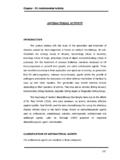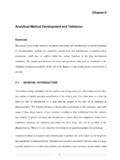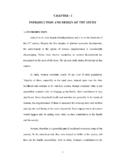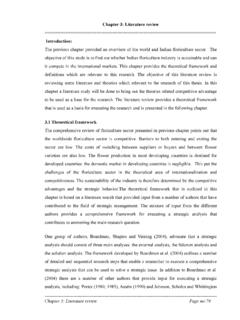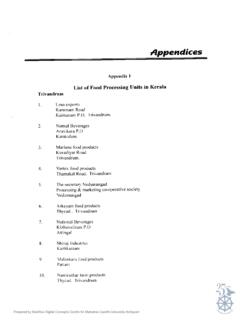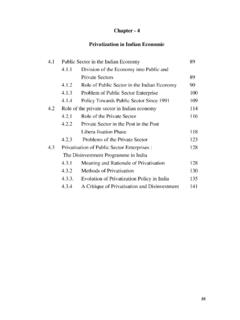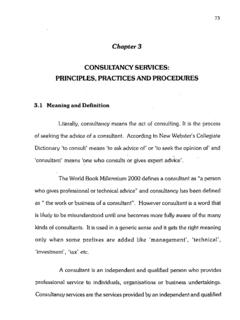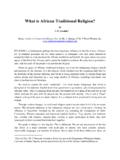Transcription of CHAPTER III EDUCATIONAL POLICIES IN INDIA UNDER …
1 CHAPTER III. EDUCATIONAL POLICIES IN INDIA . UNDER THE BRITISH RULE. INTRODUCTION. Right from the beginning of their relationship with INDIA , the British, who had come as traders and had become rulers and administrators, had influenced the economic, political and EDUCATIONAL systems of the country. Their impact on the cultural and social life of INDIA was, however, gradual. It is essential to review the EDUCATIONAL POLICIES UNDER the British rule to understand the present and visualize the future. In the light of the very backdrop, the history of the development of free and compulsory education in INDIA has been analysed in the CHAPTER - V.
2 Hence the present CHAPTER -III aims to briefly look at EDUCATIONAL POLICIES adopted by the British rulers in INDIA from the Charter Act of 1813 to the attainment of Independence in 1947. EDUCATIONAL POLICIES IN INDIA ADOPTED BY THE BRITISH. Development of education system during the British period was determined by the needs of the colonial powers. If we analyse the development, we will find that the colonial interests of the British always shaped the then EDUCATIONAL POLICIES of INDIA . European trading companies began their commercial activities in INDIA from 1600 Gradually the Portuguese, the French, the Dutch and the English settled in some parts and commercial centres of INDIA .
3 Among them the English East INDIA Company was ultimately able to establish their rule in INDIA . Till the 19th century, they did not evolve any definite EDUCATIONAL policy (Ramana, 2012, p. 81). One should not suppose that there had been no EDUCATIONAL system before the coming of the East INDIA Company. When the British came to INDIA and were gradually establishing themselves in Bengal, they met such a system (Ghosh, 1989:2). F. W. Thomas was of the opinion that Education is no exotic in INDIA . There is no country where the love of learning had so early an origin or has exercised so lasting and powerful an influence (Thomas, 1891, p.)
4 1). The modern system of education came to be established in INDIA during the British period at the cost of the traditional indigenous system. Before the British established a new system of education in INDIA both the Hindus and the Muslims had their own systems of education. Both the systems went into oblivion gradually and suffered a set back because of political turmoil and lack of a strong centralised political authority and want of suitable patronage (Purkait, 1992, ). Indian education had always been of a classical and spiritual rather of a practical nature.
5 It was communicated through the sacred classical languages of the Hindus and the Muslims, namely Sanskrit, Arabic and Persian (Ghosh, 1989, ). The Tols and Madrassas were the highest seminaries of learning meant for the specialists. These institutions were not meant for education of an elementary kind. For primary education, there were in the villages, Patsalas and EDUCATIONAL POLICIES in INDIA UNDER the British Rule | 56. Maktabs where the Gurus and Maulavis imparted knowledge of the three R s to the boys of the locality. There was no school for the education of the girls though the Zamindars often had their daughters educated at home (Ghosh, 1989, ).
6 The indigenous Indian Education started with the advent of the British. The colonial interests of the British shaped the then EDUCATIONAL POLICIES of INDIA . In his book, Education in British INDIA ' Arthur Howell says. "Education in INDIA UNDER the British Government was first ignored, then violently and successfully opposed, then conducted on a system now universally admitted to be erroneous and finally placed on its present footing" (1872:3). The development of education system during the British period was determined by the needs of the colonial powers.
7 However the attitude of the British to education when they came to Bengal was one of the differences, and this was naturally so since INDIA was yet to be a British colony and they were not yet the representatives of the British Crown. They were the employees of a great commercial concern called the East INDIA Company. The Head quarter of the Company were located at London and consisted of twenty four Directors, who used to manage the affairs of the Company abroad. For each of the British establishments in Calcutta, Bombay and Madras, they appointed a Governor.
8 After Regulating Act of 1773, the Governor of Calcutta was called the Governor- General and was given supervisory power over the Governors at Bombay and Madrassa. The East INDIA Company became a ruling power in Bengal in 1765. Following the example of the contemporary English Government, the Court of Directors refused to take on itself the responsibility for the education of the people of INDIA and decided to leave education to private effort. However, the Indian officers of the East INDIA Company urged the Court of Directors to do something for the oriental learning.
9 Some half-hearted efforts were made by the Company's Government to foster oriental learning. Warren Hastings, himself an intellectual, set up the Calcutta Madrasa in 1781. for the study and learning of Persian and Arabic. In 1791 the efforts of Jonathan Duncan, the British resident at Benares, bore fruit and a Sanskrit College was opened at Benares for the cultivation of laws, literature and religion of the Hindus. These early attempts for the education of the people in oriental languages met with little success. The historians Grover and Alka (2014) explained the hidden policy of the British East INDIA Company in their attempts of the people in oriental languages that administrative needs of the Company required Indians well-versed in the classic and vernacular languages.
10 In the Judicial Department Indians conversant with Sanskrit, Arabic or Persian were required to sit as assessors with English judges and expound Hindu or Muslim law from Sanskrit or Persian or Arabic books. Besides, the knowledge of Persian and vernaculars was valued in the political department for correspondence with rulers of Indian states. The clerical staff in the revenue and commercial departments had contacts with uneducated masses and for them knowledge of vernaculars was a must (p. 257). EDUCATIONAL POLICIES in INDIA UNDER the British Rule | 57.
